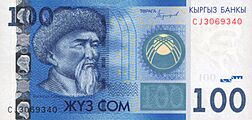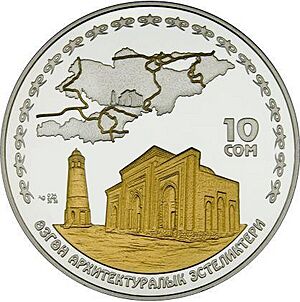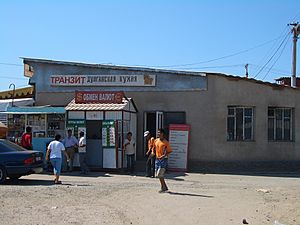Kyrgyz som facts for kids
Quick facts for kids Kyrgyz som |
|||
|---|---|---|---|
|
|||
| ISO 4217 Code | KGS | ||
| User(s) | |||
| Inflation | 7.3% (December 2023) | ||
| Subunit | |||
| 1⁄100 | tyiyn | ||
| Symbol | ⃀ | ||
| Plural | The language(s) of this currency does not have a morphological plural distinction. | ||
| Coins | |||
| Freq. used | 1, 3, 5, 10 som | ||
| Rarely used | 1, 10, 50 tyiyn | ||
| Banknotes | |||
| Freq. used | 20, 50, 100, 200, 500, 1,000 som | ||
| Rarely used | 1, 10, 50 tyiyn, 1, 5, 10, 2,000, 5,000 som | ||
The som is the official money used in Kyrgyzstan. It has its own special code, KGS, and a unique symbol: ⃀. Just like how we use dollars or euros, people in Kyrgyzstan use the som to buy things and pay for services.
Contents
What Does "Som" Mean?
The word som comes from old Turkic languages. It means "pure". This word was used to describe pure silver or gold. So, when they named their money "som", it was like saying "pure money". This is similar to how the British currency, sterling, also has a meaning related to pure silver.
The Som's Special Symbol
Every currency has a symbol, like the dollar sign ($) or the euro sign (€). For the Kyrgyz som, the official symbol is an underlined letter "С" (which looks like an 'S'). The National Bank of the Kyrgyz Republic approved this symbol in February 2017. You can find this symbol in computer systems as something called "SOM SIGN".
How the Som Started
For a long time, Kyrgyzstan was part of the Soviet Union. All the countries in the Soviet Union used the same money, called the Soviet ruble.
When the Soviet Union broke up in 1991, many countries became independent. At first, some leaders hoped to keep using the ruble together. But it was hard for all the new countries to agree on how to manage the money. Each country started printing a lot of money, which caused problems.
So, in July 1993, Russia decided to stop using the old ruble. This meant all the other former Soviet countries needed their own money.
Kyrgyzstan introduced its own currency, the Kyrgyz som, on May 10, 1993. It replaced the old Soviet ruble. One som was worth 200 rubles. At first, only paper money was made. Coins came much later, in 2008.
Coins of the Som
Coins were first used in Kyrgyzstan in January 2008. Before that, people only used banknotes. Coins became popular because they were easier for things like slot machines and collecting bus fares.
The first coins were made in small amounts called "tyiyn" (10 and 50 tyiyn). They also made coins for 1, 3, and 5 som. A 10 som coin was added in 2009.
All Kyrgyz coins are made in Kazakhstan. They look a bit like the coins used in Russia.
| Image | Value | Technical details | What they show | Dates | |||||||||||
|---|---|---|---|---|---|---|---|---|---|---|---|---|---|---|---|
| Diameter | Weight | Material | Edge | Front | Back | Minted | Issued | Withdrawn | Stopped | ||||||
| 1 tyin | 14 mm | 1.0 g | Brass-plated steel | Grooved | A flower (гүл/ gul) | Emblem of Kyrgyzstan, country name, year | 2008 | 1 January 2008 | Still valid, but not often used | ||||||
| 10 tyin | 15 mm | 1.3 g | Still valid | ||||||||||||
| 50 tyin | 17 mm | 1.8 g | |||||||||||||
| 1 som | 19 mm | 2.5g | Nickel-plated steel | Grooved | A leather bottle called a "kookor" with a triangle symbol ("tumar"). | Emblem of Kyrgyzstan, country name, year | 2008 | 1 January 2008 | Still valid | ||||||
  |
3 som | 21 mm | 3.2 g | ||||||||||||
  |
5 som | 23 mm | 4.2 g | ||||||||||||
  |
10 som | 24.5 mm | 5.4 g | 2009 | 1 December 2009 | ||||||||||
  |
Words "Он сом", a five-pointed star, «10 СОМ» | 1 September 2014 | |||||||||||||
| These images are to scale at 2.5 pixels per millimetre. For table standards, see the coin specification table. | |||||||||||||||
Special Collector Coins
The National Bank of the Kyrgyz Republic also makes special coins for collectors. These coins are often made of silver or gold. They are not meant for everyday shopping. They are like special art pieces for people who collect money.
Banknotes of the Som
Since 1993, Kyrgyzstan has released several series of banknotes. Each series has different designs and security features.
- First Series (1993): These were the very first banknotes. They included small values like 1, 10, and 50 tyiyn, and larger values like 1, 5, and 20 som. They were printed in Great Britain.
- Second Series (1994–1995): These banknotes had better protection against fake money. They featured important Kyrgyz people and famous places.
- Third Series (1997–2005): This series continued with similar themes but had updated designs. When coins were introduced in 2008, the smaller banknotes (1, 5, 10 som) slowly stopped being used.
- Fourth Series (2009–2016): This series introduced a very large 5,000 som note. These notes have even more advanced security features to prevent counterfeiting.
- Fifth Series (2023): The newest series of banknotes started coming out in 2023. These notes have updated designs and the latest security features.
First Series (1993)
These were the first banknotes of Kyrgyzstan. They were designed by Dmitry Lysogorov and A. P. Tsygank.
| Image | Value | Size | What they show | Dates | ||||||
|---|---|---|---|---|---|---|---|---|---|---|
| Front | Back | Front | Back | Watermark | Printed | Issued | Withdrawn | Stopped | ||
 |
 |
1 tyiyn | 90×70 mm | Value, Kyrgyz eagle | Value, Emblem of Kyrgyzstan | Repeating eagle (1993). Mushroom design (1999 and 2001). |
No date | 10 May 1993 | Still valid, but rarely seen. | |
 |
 |
10 tyiyn | ||||||||
 |
 |
50 tyiyn | ||||||||
 |
 |
1 som | 140×70 mm | Value, Manas | Value, Manas Ordo | Repeating eagle | ||||
 |
 |
5 som | ||||||||
 |
 |
20 som | ||||||||
| These images are to scale at 0.7 pixel per millimetre. For table standards, see the banknote specification table. | ||||||||||
Second Series (1994–1995)
These banknotes had better security features to prevent fake money.
| Image | Value | Size | What they show | Dates | ||||||
|---|---|---|---|---|---|---|---|---|---|---|
| Front | Back | Front | Back | Watermark | Printed | Issued | Withdrawn | Stopped | ||
 |
 |
1 som | 135 х 65 mm | Abdylas Maldybaev | Komuz, kylkyak, Bishkek Philharmonic Orchestra | Toktogul Satylganov | No date | 11 April 1994 | Still valid, but rarely seen. | |
 |
 |
5 som | Bubusara Beyshenalieva | Kyrgyz National Opera | ||||||
 |
 |
10 som | Kasym Tynystanov | Mountains of Kyrgyzstan and the Dzhety-Oguz tract | 28 January 1994 | |||||
 |
 |
20 som | Togolok Moldo | Manas Mausoleum | 11 April 1994 | |||||
 |
 |
50 som | Kurmanjan Datka | Uzgen architectural complex | 29 August 1994 | |||||
 |
 |
100 som | Toktogul Satylganov | Toktogul Hydroelectric Power Station | 20 March 1995 | |||||
| These images are to scale at 0.7 pixel per millimetre. For table standards, see the banknote specification table. | ||||||||||
Third Series (1997–2005)
This series had improved designs. The smaller banknotes (1, 5, 10 som) were slowly replaced by coins starting in 2008.
| Image | Value | Size | What they show | Dates | ||||||
|---|---|---|---|---|---|---|---|---|---|---|
| Front | Back | Front | Back | Watermark | Printed | Issued | Withdrawn | Stopped | ||
| 1 som | 120 × 60 mm | Abdylas Maldybaev | Komuz, kylkyak, Bishkek Philharmonic Orchestra |
Same as portrait | 1999 | 7 February 2000 | Still valid, but not issued anymore. | |||
| 5 som | 135 х 65 mm | Bubusara Beyshenalieva | Kyrgyz National Opera | 1997 | 17 December 1997 | |||||
| 10 som | Kasym Tynystanov | Mountains of Kyrgyzstan and the Dzhety-Oguz tract | ||||||||
| 20 som | Togolok Moldo | Manas Mausoleum | Same as portrait, and value | 2002 | 15 August 2002 | |||||
| 50 som | 145 × 70 mm | Kurmanjan Datka | Uzgen architectural complex | |||||||
 |
 |
100 som | 150 × 72 mm | Toktogul Satylganov | Khan Tengri mountain | |||||
 |
 |
200 som | 155 × 74 mm | Alykul Osmonov | Lake Issyk Kul | 2000 | 28 August 2000 | |||
 |
 |
2004 | 2 August 2004 | |||||||
 |
 |
500 som | 160 × 76 mm | Sayakbay Karalaev | Sayakbay Karalaev and images from the Manas (epic) | 2000 | 28 August 2000 | |||
 |
 |
2005 | 1 November 2005 | |||||||
 |
 |
1,000 som | 165 × 78 mm | Jusup Balasagyn | Takhti Sulaiman, Mount Sulaiman | 2000 | 28 August 2000 | |||
| These images are to scale at 0.7 pixel per millimetre. For table standards, see the banknote specification table. | ||||||||||
Fourth Series (2009–2016)
This series brought new designs and even better security features.
| Image | Value | Size | What they show | Dates | ||||||
|---|---|---|---|---|---|---|---|---|---|---|
| Front | Back | Front | Back | Watermark | Printed | Issued | Withdrawn | Stopped | ||
| 20 som | 120 × 58 mm | Togolok Moldo | Tash Rabat | Same as portrait | 2009 | 1 July 2009 | Still valid | |||
 |
2016 | 20 December 2018 | ||||||||
| 50 som | 126 × 61 mm | Kurmanjan Datka | Minaret and mausoleum | 2009 | 1 July 2009 | |||||
| 2016 | 1 March 2017 | |||||||||
| 100 som | 132 × 63 mm | Toktogul Satylganov | Toktogul Hydroelectric Power Station | 2009 | 1 July 2009 | |||||
| 2016 | 1 March 2017 | |||||||||
| 200 som | 138 × 66 mm | Alykul Osmonov | Lake Issyk-Kul | 2010 | 1 December 2010 | |||||
| 2016 | 1 January 2017 | |||||||||
| 500 som | 144 × 68 mm | Sayakbay Karalaev | Manas Mausoleum | 2010 | 1 December 2010 | |||||
| 2016 | 1 January 2017 | |||||||||
| 1,000 som | 150 × 71 mm | Jusup Balasagyn | Takhti Sulaiman, Mount Sulaiman | 2010 | 1 December 2010 | |||||
| 2016 | 1 January 2017 | |||||||||
| 5,000 som | 156 × 73 mm | Suimenkul Chokmorov | Ala-Too Square | 2009 | 2 March 2009 | |||||
| 2016 | 20 December 2018 | |||||||||
| These images are to scale at 0.7 pixel per millimetre. For table standards, see the banknote specification table. | ||||||||||
Fifth Series (2023)
This is the newest series of banknotes.
| Image | Value | Size | What they show | Dates | ||||||
|---|---|---|---|---|---|---|---|---|---|---|
| Front | Back | Front | Back | Watermark | Printed | Issued | Withdrawn | Stopped | ||
| 20 som | 120 × 58 mm | Togolok Moldo | Tash Rabat | Togolok Moldo | 2023 | 15 February 2024 | Still valid | |||
| 50 som | 126 × 61 mm | Kurmanjan Datka | Minaret and mausoleum | Kurmanjan Datka | ||||||
| 100 som | 132 × 63 mm | Toktogul Satylganov | Toktogul Dam | Toktogul Satylganov | ||||||
 |
200 som | 138 × 66 mm | Alykul Osmonov | Lake Issyk-Kul | Alykul Osmonov | 10 May 2023 | ||||
 |
 |
500 som | 144 × 68 mm | Sayakbay Karalaev | Manas Mausoleum | Sayakbay Karalaev | ||||
 |
 |
1,000 som | 150 × 71 mm | Jusup Balasagyn | Takhti Sulaiman | Jusup Balasagyn | ||||
| 5,000 som | 156 x 73 mm | Suimenkul Chokmorov | Ala-Too | Suimenkul Chokmorov | 10 May 2024 | |||||
Special Collector Banknotes
Sometimes, special banknotes are made for collectors. These are not used for everyday shopping. For example, in 2014, special 100 and 200 som notes were made to celebrate the birthdays of famous Kyrgyz people. Only 3,000 of each were printed.
In 2017, a special 2,000 som banknote was released. This was to celebrate 25 years of Kyrgyzstan's independence and the som's introduction.
| Image | Value | Size | What they show | Dates | ||||||
|---|---|---|---|---|---|---|---|---|---|---|
| Front | Back | Front | Back | Watermark | Printed | Issued | Withdrawn | Stopped | ||
| 100 som | 132 × 63 mm | Toktogul Satylganov | Toktogul Hydroelectric Power Station | Toktogul Satylganov | 2009 | 20 October 2014 | Still valid | |||
| 200 som | 138 × 66 mm | Alykul Osmonov | Lake Issyk-Kul | Toktogul Satylganov | 2009 | |||||
| 2,000 som | 156 × 73 mm | Monument of Manas, a stylised yurt, symbol of "Umai Ene" | Stylised tree, Khan Tengri mountain, eagle flying over lake Issyk-Kul | Toktogul Satylganov | 2017 | 17 November 2017 | ||||
| These images are to scale at 0.7 pixel per millimetre. For table standards, see the banknote specification table. | ||||||||||
Where to Exchange Money
If you visit Kyrgyzstan, you can exchange your country's money for Kyrgyz som. Places called currency exchange kiosks, like those found in Bishkek's Dordoy Bazaar, can help you do this. They show you how much foreign money is worth in Kyrgyz som.
See also
- Economy of Kyrgyzstan
- Uzbekistani sum





